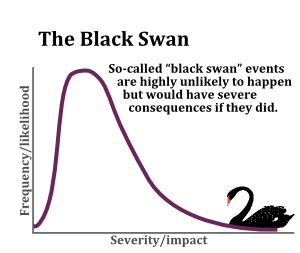
American people’s views on climate change can be broadly divided into three categories- the climate deniers – people who do not think that climate change is a concern, people who accept climate change as a phenomenon but downplay the threats associated with it, and finally, the alarmists – who think that we need to act now if we are to have any chance in mitigating the effects of climate change, or else, we face a global catastrophe.
So, who is right and who should we believe? Science has definitely proven that climate change is a reality. Moving on to the other two groups. It is difficult to predict the future accurately based on the current data. In addition, there is an interplay of a number of factors, whose combined effects are extremely difficult to compute. However, scientists can make probabilistic projections based on current data.
Possible Climate Change Scenarios
The Intergovernmental Panel on Climate Change (IPCC) – a UN body studying the risk of climate change, has come up with four scenarios in its fifth Assessment Report (AR5). The four scenarios are RCP2.6, RCP4.5, RCP6.0, and RCP8.5. RCP2.6 projects the global mean increases in the earth’s temperature by 1.0 degree Celsius and a sea-level rise of 0.40 m. Subsequent RCPs project a progressively higher rise in global temperature and sea level. The projected global sea-level rise across all scenarios ranges from 0.26 m to 0.82 m in the late 21st century. The debate surrounding climate change boils down to this range. Climate scientists and researchers around the world are working towards getting a more accurate projection and a more concrete plan of action to combat climate change
In the meantime, probability can help us decide our attitude towards climate change. Any valid projection has a probability associated with it unless of course, the projection is made by looking at a crystal glass. These RCPs describe the most common scenarios. In addition, humans tend to form their plan of action based on the most probable event. However, here is where our reliance on mathematics to answer all our questions falls short. Since we do not think too much about the event that is least probable, we are not prepared for that event when it occurs. Such events are called Black Swan events.
Black Swan Event
Black Swan event is an event that has an extremely low probability of occurring, however, if and when that event occurs, the consequences are disastrous. These are era-defining events and change the course of humanity. Contemporary examples of black swan events are the attacks of 9/11 or the Global Financial Crisis. Another characteristic of a Black Swan event is that it is extremely difficult to predict owing to its low probability, but extremely easy to explain in the hindsight. The telltale signs are always there. We just choose to ignore them because they seem so unlikely to us.
So how does this apply to Climate Change? Since we do not have an accurate projection of the future, we are doing what we humans do best – prepare for the most probable outcome. That would suffice if the plan is flexible to take into account any new knowledge that our research may reveal. However, there are two problems with the way we are dealing with Climate Change – a) Our plan is in no way as adaptive as it should be. On the contrary, the actions of a few major countries in light of the Paris agreement may even suggest that we are taking a step backward; b) The difference in the projections of the RCPs. There is a large difference in the projections from one RCP to the other. For example, RCP 4.5 predicts an almost two-fold rise in sea level when compared to the projections of RCP 2.6. In such a scenario, preparations for the RCP 2.6 scenario will not be of much help if the world experiences RCP 4.5.
Similarly, the probabilities associated with RCP 6.0 and RCP 8.5 are very small. But, since the consequences associated with them are so catastrophic, they are potential Black Swan events.
If there is one lesson to learn from history, it is that no event is ever “unlikely”, and a reason why the unlikely events have such a large impact is partially because human societies do not prepare for it. Especially when it comes to climate change, which poses an existential threat to the entire world, it is better to prepare for the worst and then hope for the best.
Hence folks, if you want this planet to habitable for the future generations, sound the alarm bells right now – coz the sea levels are rising!

